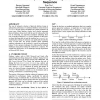Free Online Productivity Tools
i2Speak
i2Symbol
i2OCR
iTex2Img
iWeb2Print
iWeb2Shot
i2Type
iPdf2Split
iPdf2Merge
i2Bopomofo
i2Arabic
i2Style
i2Image
i2PDF
iLatex2Rtf
Sci2ools
192
click to vote
SIGMOD
2006
ACM
2006
ACM
Automatic physical design tuning: workload as a sequence
The area of automatic selection of physical database design to optimize the performance of a relational database system based on a workload of SQL queries and updates has gained prominence in recent years. Major database vendors have released automated physical database design tools with the goal of reducing the total cost of ownership. An important assumption underlying these tools is that the workload is a set of SQL statements. In this paper, we show that being able to treat the workload as a sequence, i.e., exploiting the ordering of statements can significantly broaden the usage of such tools. We present scenarios where exploiting sequence information in the workload is crucial for performance tuning. We also propose techniques for addressing the technical challenges arising from treating the workload as a sequence. We evaluate the effectiveness of our techniques through experiments on Microsoft SQL Server.
Related Content
| Added | 08 Dec 2009 |
| Updated | 08 Dec 2009 |
| Type | Conference |
| Year | 2006 |
| Where | SIGMOD |
| Authors | Sanjay Agrawal, Eric Chu, Vivek R. Narasayya |
Comments (0)

